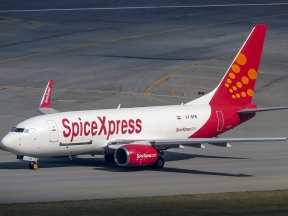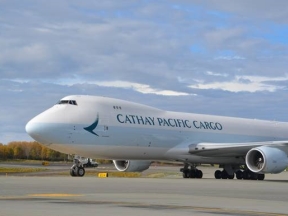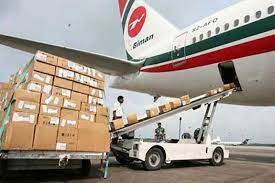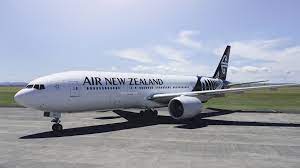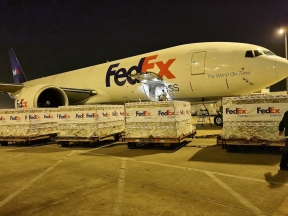SpiceXpress has confirmed acquiring electric cargo airplanes developed by US-based Bye Aerospace, in collaboration with India’s Pifore Group. The total investment is being estimated to be INR 300 to INR 500 million. The alliance is a pilot project to promote zero-emission freighters and also a closed airfield as emission free airport with an electric plane fleet and other zero-emission products. Pifore Group is engaged in provision of engineering, construction and technical services for private as well as public & government agencies/companies in India. They have signed an MoU with Bye Aerospace to deliver five electric cargo airplanes, which will be leased by SpiceXpress by 2024 and an additional five airplanes to be leased by 2026. Earlier this year, Spice Jet had transferred its logistics business to its subsidiary SpiceXpress and Logistics. SpiceXpress is a cargo specialist and is currently in the process of being hived off its parent company.
Read More »Philadelphia Airport plans cargo expansion with help from the US
US Federal Government funding will help Philadelphia International Airport (PHL) roll out its $1.2bn cargo expansion programme. PHL’s cargo expansion programme, which was announced in June, will see the airport increase its air cargo facility footprint by 136 acres and almost triple its cargo building square footage from 600,000 to 1.4m. Congresswoman Mary Gay Scanlon (PA-05) said, “PHL’s vision for the use of these funds through a robust cargo expansion means new opportunities for individuals across our region.” The cargo development programme will not only help PHL obtain a bigger portion of air cargo that comes into the Greater Philadelphia area, it could also have an annual economic impact of $870 million for the region and create as many as 6,000 permanent jobs and approximately 5,000 construction jobs annually over the course of the project.
Read More »Cathay Pacific announces suspension of long-haul cargo operations
Cathay Pacific has suspended all long-haul freighter and cargo-only passenger flights to and from Hong Kong until January 6. The Hong Kong carrier said the move was in response to recently announced more stringent quarantine requirements for Hong Kong-based cargo crews. The suspension applies to all long-haul cargo flights covering the transpacific, Europe, South West Pacific, Riyadh, and Dubai. “We sincerely apologise for the disruption caused. We will be working with customers to mitigate the disruption as much as possible,” the airline’s cargo division stated. “In addition, we are working with the relevant stakeholders on plans beyond 6 January and will communicate further on these as soon as possible.” On December 28, the carrier had warned that the new crew restrictions could affect operations through the first quarter.
Read More »HKIA cargo volume increase year-on-year to 10.1%
Hong Kong International Airport’s (HKIA) cargo volumes in November saw a year-on-year increase of 10.1% to 478,000 tonnes as monthly passenger numbers also increased. The increase in cargo throughput was mainly attributed to the 16.1% growth in transshipments, continuing the traditional peak period for air cargo. Airport Authority Hong Kong (AAHK) said that overall cargo to and from North America, Europe and Southeast Asia experienced the most significant increases during November. Meanwhile, the airport handled 120,000 passengers in the month, a 48.1% rise. In the first 11 months of the year, HKIA handled 4.6m tonnes of cargo, an increase of 12.9% compared to the same month last year. On a 12-month rolling basis, HKIA handled 5m tonnes of cargo, an 11.6% year-on-year increase.
Read More »New Bangladesh airline announces operations in 2022
A new cargo airline in Bangladesh is due to commence operations next year. NXT Air has released a statement to local media confirming it has received a No Objection Certificate (NOC) from the Civil Aviation Authority of Bangladesh (CAAB). Cox’s Bazar Airport in the south of Bangladesh will be the main operation base for the cargo carrier. The airline’s plans to initially use an ATR 72 to carry cargo. A second ATR 72 and a Boeing 738 are due to be introduced later in the year to enable the airline to operate on international routes. Cargo airlines in Bangladesh include Bismillah Airlines, Easy Fly Express, Hello Airlines and SkyAir.
Read More »Etihad Airways and Henan Province Airport to strengthen Sino-Arab cargo ties
Etihad Airways and Henan Province Airport Group, the parent company of the Zhengzhou Xinzheng Airport (CGO) — an important domestic aviation hub and the gateway to the central region of China — aim to establish a strategic partnership to strengthen aviation ties between the UAE and China. This follows the signing of a virtual Memorandum of Understanding (MOU) during the virtual “Zhengzhou Week” event hosted by Expo 2020 Dubai China Pavilion starting from 27 December 2021. The MOU contains plans for Etihad’s potential operation of regular cargo services between Abu Dhabi International Airport (AUH) and Zhengzhou Xinzheng International Airport (CGO) to create the “Air Silk Road” between Henan Province and the emirate of Abu Dhabi. The MOU also covers scope of cooperation between the two parties to build the CGO airport into an air freight hub in the region, and to diversify product sales and cargo distribution channels at Zhengzhou Xinzheng International Airport.
Read More »Air New Zealand releases document to deploy zero-emissions aircraft
Air New Zealand aims to deploy zero-emissions aircraft in the next five years. The airline has released a Zero Emissions Aircraft Product Requirements Document that details Air New Zealand’s specifications and requirements for a new generation of aircraft. Air New Zealand said it “is seeking long term partnerships with aircraft developers looking to develop zero emissions aircraft. From the PRD process Air New Zealand is seeking to gain an understanding from the aircraft developers of the realistic implementation timeline and technology feasibility to enable long term fleet strategy evaluation”. The overall goal is for zero-emissions aircraft to be deployed in the next five years, with battery electric propulsion, hybrid electric propulsion and green hydrogen propulsion being considered. Air New Zealand’s decarbonisation roadmap identifies four main levers needed to reach net zero by 2050. These are the use of sustainable aviation fuel (SAF); the operation of zero emissions aircraft; continued investment in the modern fleet replacement programme; and improvements in operational efficiencies (such as through optimised flight planning).
Read More »DHL, MIAL and Kale Logistics partners for paperless import operations
DHL Global Forwarding announces a collaboration with Mumbai International Airport Ltd. (MIAL) and Kale Logistics for the pilot rollout of D-Cube for paperless and contactless import operations. Soon MIAL will not require hard copies of MAWBs (Master airway bill) and HAWBs (House airway bill) to be submitted by DHL Global Forwarding, said Niki Frank, CEO South Asia and India, DHL Global Forwarding in a Linkedin post. This digital initiative facilitates ease of business to support all forwarders, customs brokers, transporters and customers, on the air import businesswith a ‘contactless’ and ‘paperless’ process, fast-tracking the deliverables factoring safety and security. The post read that queues at the Air Cargo Terminal will become a thing of the past with Digitalized Gate Passes to shortly be introduced. Being a major air cargo player at the Mumbai Terminal, DHL Global Forwarding volunteered to support this progressive initiative and played a significant role in its implementation. A well-aligned move to DPDHL’s own digitalization mission.
Read More »FedEx predicts ongoing cargo capacity constraints to continue in 2022
FedEx is predicting that next year air cargo capacity will once again be hard to secure with space remaining scarce and supply chain issues supporting strong demand. Karen Reddington, president of FedEx Express Europe, explained that passenger networks – and therefore bellyhold services – were taking time to resume and this would put cargo capacity under pressure. She said, “The pandemic has undoubtedly brought supply chain resilience to the fore. With a new, highly contagious Covid-19 variant, reduced port and air cargo capacity and heightened consumer demand, it will continue to impact global trade well into 2022. As passenger travel remains depleted, air cargo capacity will be constrained through 2022 all while the demand for goods is likely to grow, with 2021 trading volumes overtaking pre-pandemic levels and achieving their fastest year of growth in over a decade.”
Read More »Ethiopian Airlines receives IATA’s CEIV Pharma certification
Ethiopian Airlines has received IATA’s Center of Excellence for Independent Validators in Pharmaceutical Logistics (CEIV Pharma) certification as an airline and for ground handling. The airline said it is the first airline in Africa to receive the CEIV pharma certification. The milestone is anticipated to aid it in providing efficient & effective transportation of pharmaceuticals throughout its global pharma network. Ethiopian, in recent years, has invested heavily in infrastructure, equipment, people, system and processes to enhance its pharmaceutical core handling capabilities throughout its pharma network. Cold storage areas in these freight facilities are dedicated to the handling of pharmaceuticals & healthcare products and equipped with dedicated climate control ranging between -30OC to +25OC. These facilities are monitored through a smart web-based system that allows real-time management of all zones and is capable of triggering SMS, phone call & email actions in case of an emergency.
Read More » Cargo Breaking News
Cargo Breaking News
